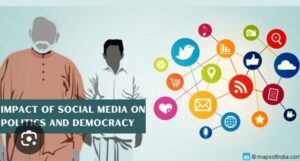

By Dada Ahmed.

Photo credit:LinkedIn.
For many, particularly the uninformed segment of the Nigerian population, the connection between social media and politics is not readily apparent. This lack of awareness is understandable, as intellectual discourse on this subject is still developing in Nigeria.
Many Nigerians view cyber and social media issues strictly in terms of computers and networks, focusing on the Internet and related technologies. Similarly, their understanding of politics is often limited to winning elections, sharing political appointments, and influencing governmental policies and programs. They see government as the art or science of holding control over governmental functions, without recognizing the interplay between cyber technologies and politics.
However, the relationship between social media and politics is much more intricate. Artificial Intelligence, particularly language models like ChatGPT-3.5, offers a broader perspective on this topic. These AI models examine the relationship between cyber and politics on a wider spectrum, using a concept called the symbiotic parameter.
Despite differences in the contextual meanings of cyber and politics, AI highlights the importance of cybersecurity in protecting government systems, elections, and sensitive information from cyberattacks. Politics, in turn, shapes cybersecurity policies and regulations. Cyber activities, such as hacking and disinformation campaigns, can influence political events and elections.
There’s a significant relationship between social media, social demography, and voting behavior in Nigeria. Social media has become a prominent platform for political discourse, influencing public opinion, especially among the youth. Social demography, including factors like age, education, and urbanization, affects how individuals engage with social media and form their political opinions. Consequently, social media campaigns and discussions can sway voting behavior by shaping perceptions and decisions.
To provide deeper insights into the relationship between cyber and politics, a book was recently launched in Ibadan, the Oyo state capital. On April 19, 2024, professionals from various fields, including mass communication experts, academics, politicians, business leaders, and other segments of Nigerian society, gathered in Ibadan for the launch of “Cyber Politics: Social Media, Social Demography, and Voting Behaviour in Nigeria” at the University of Ibadan.
Authored by Dr. Omoniyi Ibietan, Head of Media Relations Management at the Nigerian Communications Commission (NCC), the book has been acclaimed as a masterpiece that enriches understanding of the relationship between cyber and politics in Nigeria.
Dr. Aminu Maida, Executive Vice Chairman of the NCC, delivered a goodwill message at the event, highlighting the transformative impact of the Internet and associated technologies on political communication. He noted that digital platforms have expanded human freedoms and expressions, enabling citizens to engage with political processes in unprecedented ways. The 2008 presidential election in America marked a watershed moment for digital political engagement, with social media platforms playing a crucial role in political communication.
Dr. Ibietan’s book examines the interface between social media networks and voting behavior in Nigeria, drawing insights from the 2015 presidential election. It explores how social and demographic factors, digital social mediation, and other variables influence voting behavior. The book introduces the Channel-Factor Model, a new methodology for understanding the relationship between social media and politics, proposing a framework for re-engineering political communication in Africa.
Professor Umaru A. Pate, Vice Chancellor of the Federal University, Kashere, and President of the Association of Communication Scholars and Professionals of Nigeria (ACSPN), praised the book for providing a deeper understanding of cyber politics in Nigeria. He recommended it as a valuable resource for students of communication studies, political science, and related fields, as well as for political tacticians and scholars interested in the impact of social media on politics.
The launch of “Cyber Politics: Social Media, Social Demography, and Voting Behaviour in Nigeria” enriches the Nigerian academic and political landscape, providing a comprehensive understanding of the relationship between cyber and politics. This effort by Dr. Omoniyi Ibietan sets a solid foundation for further intellectual exploration in this field, encouraging other scholars to contribute to this vital area of study.
By deepening our understanding of the interplay between social media and politics, we can work towards a more informed and engaged political climate in Nigeria, fostering peace and stability in the nation’s political processes.
Dada Ahmed publishes The Reporters.

